The stock market last week from September 11 to 15 recorded strong fluctuations with an overwhelming selling trend in most sectors, especially real estate. VN-Index at times fell more than 30 points, then recovered slightly at the end of the week, down more than 14 points (-1.14%) to over 1,227 points.
Synchronous development with exchange rate
The main trend of the market last week was still a strong correction, especially when investor sentiment was affected by information about continuously rising exchange rates. That trend was recorded through strong net selling activities of foreign investors and was the main factor putting pressure on the stock market.
Dinh Quang Hinh, an analyst at VNDirect, said investors were particularly interested in exchange rate developments. He said, "'Increased pressure in recent weeks and net selling by foreign investors have dampened the market's excitement."
Specifically, last week, foreign investors on HoSE net sold up to VND2,147 billion, mainly through order matching. This was also the week that recorded portfolio restructuring activities of the 3 largest exchange-traded funds (ETFs) on the floor.
Looking at each code separately, HPG of Hoa Phat, STB of Sacombank and SHB were sold the most with values of 709 billion, 378 billion and 212 billion VND respectively. In addition, other leading codes such as VIC, MWG, VCI, KBC also had more than 100 billion VND withdrawn.
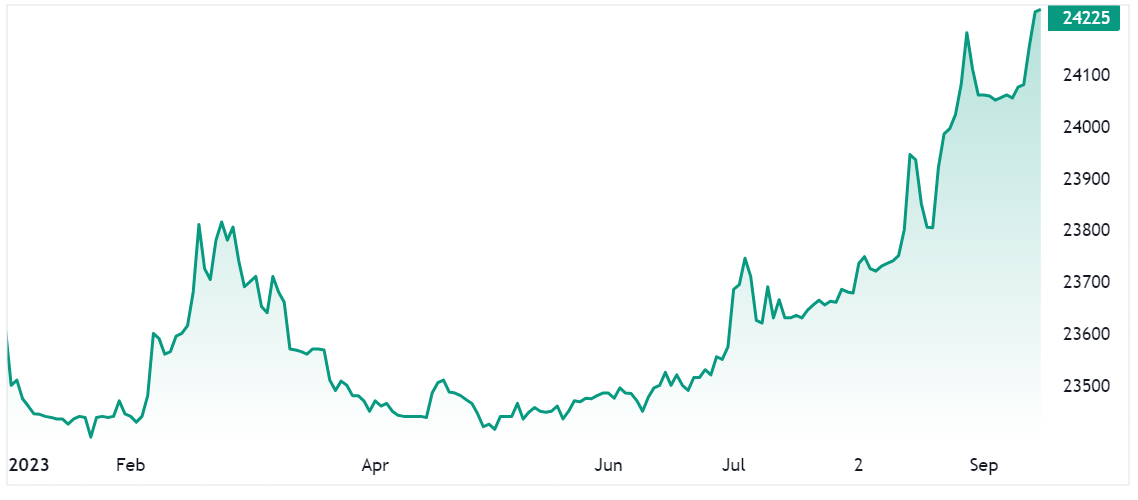
In fact, the movement of foreign capital flows is quite similar to the trend of exchange rates. Foreign investors have reversed to a continuous net selling trend since around April, which is also the time when the USD/VND exchange rate tends to increase more and more strongly.
From the beginning of April to September 15, foreign investors withdrew a total of VND13,160 billion from stocks on the HoSE. In the first half of September alone, when the exchange rate pressure was strongest, foreign investors sold a net VND3,456 billion.
The net withdrawal pressure from foreign investors is partly due to the capital withdrawal trend taking place on some large ETF funds such as Fubon ETF, DCVFM VNDiamond ETF and DCVFM VN30 ETF. This group of funds alone has net sold about VND3,300 billion since the beginning of the year (total foreign investors net sold more than VND7,200 billion since the beginning of the year).
The trend of net withdrawal of ETF funds occurred in the context of the recent escalation of exchange rates. In an environment of rising exchange rates, foreign investors will lose their advantage in holding Vietnamese stocks, because investments in VND, if converted into USD, will temporarily record a "loss".
A recent report by SSI Research also showed that ETF funds investing in Vietnam had a net withdrawal of more than VND3,400 billion in August, the largest monthly figure ever. This capital withdrawal activity is strongly influenced by the risk management psychology of foreign individual investors; usually, periods when the USD/VND exchange rate fluctuates strongly are also periods when ETF capital flows record net withdrawals.
Not too scary yet?
Although the exchange rate factor is having a significant impact on foreign capital flows on the stock market, most experts and analysts believe that this currency fluctuation is not yet at a level of concern.
The central exchange rate announced by the State Bank is at 24,036 VND/USD, which is the historical peak of this exchange rate pair. The USD price at commercial banks fluctuates around 24,000-24,440 VND for buying and selling, the USD price on the free market is around 24,180-24,260 VND.
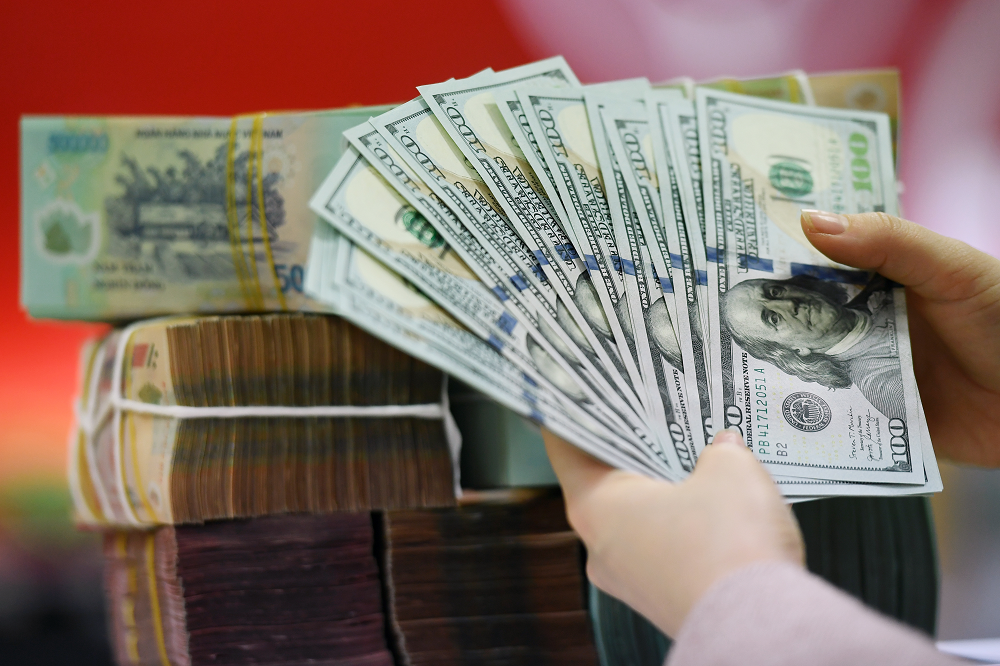
Mr. Le Anh Tuan, Director of Dragon Capital Securities, recently said that the USD exchange rate is having a difference between the official market and the black market. If the difference is large, it means that domestic investors are speculating on VND. The exchange rate has shown signs of increasing recently due to the difference between VND and USD interest rates, as well as short-term demand from businesses.
"From June onwards, the exchange rate issue is no longer a concern because exchange rate fluctuations mainly come from the relatively high interest rate difference between Vietnam and the US. When the US no longer tightens monetary policy, Vietnam will have a lot of room for monetary policy," Mr. Tuan added.
Mr. Nguyen Tu Anh - Director of the General Economic Department, Central Economic Committee, said that the domestic exchange rate is not too worrying, the exchange rate fluctuations of other countries are the risks worth paying attention to.
According to SSI Research's report, recent exchange rate fluctuations are heavily influenced by seasonal factors and the maintenance of divergent monetary policies with major central banks around the world, thereby creating greater pressure on the exchange rate in the third quarter.
However, the positive point is that the position of the State Bank is relatively different from the same period last year (thanks to the amount of foreign exchange reserves that were added in the first 6 months of the year) as well as the positive foreign currency supply such as FDI disbursement in 8 months reaching 13.1 billion USD (up 1.5% over the same period) or the estimated trade balance reaching a record surplus of 19.9 billion USD.
Sharing the same view, VNDirect analysts believe that the State Bank will still have many tools to stabilize the exchange rate this year, such as a high trade surplus, stable FDI and remittance flows, and foreign currency supply.
supplement from divestment of shares to foreign investors.
"Stabilizing the exchange rate within a suitable range will minimize negative impacts and improve
competitiveness of Vietnam's exports", VNDirect expert expressed.
However, the group of experts also noted that the increase in exchange rate will put more pressure on foreign debt repayment (especially in the private sector), while increasing inflationary pressure due to increased import prices. Therefore, the greater the exchange rate pressure, the narrower the room for further easing of domestic monetary policy.
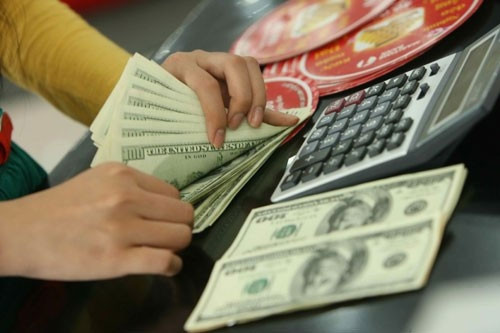
Source





![[Photo] National Assembly Chairman Tran Thanh Man attends the Party Congress of the Committee for Culture and Social Affairs](https://vphoto.vietnam.vn/thumb/1200x675/vietnam/resource/IMAGE/2025/5/11/f5ed02beb9404bca998a08b34ef255a6)




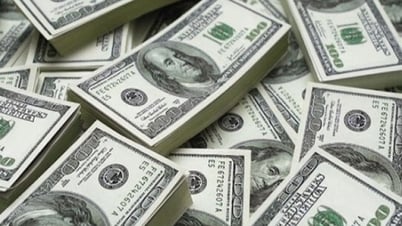



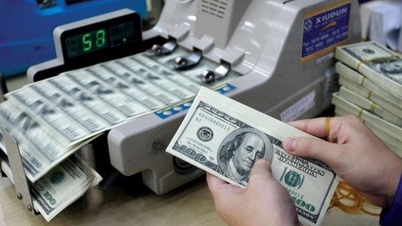

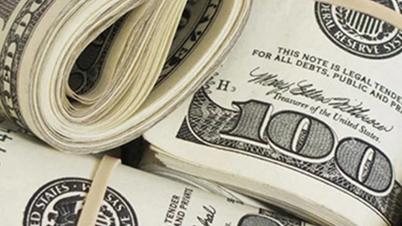
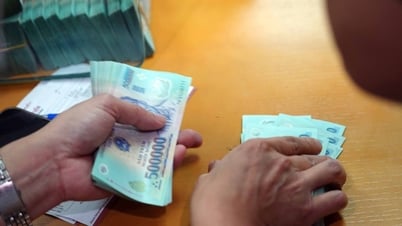


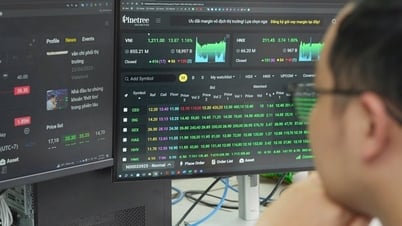












![[Photo] National Assembly Chairman works with leaders of Can Tho city, Hau Giang and Soc Trang provinces](https://vphoto.vietnam.vn/thumb/1200x675/vietnam/resource/IMAGE/2025/5/11/c40b0aead4bd43c8ba1f48d2de40720e)
![[Photo] Discover the beautiful scenery of Wulingyuan in Zhangjiajie, China](https://vphoto.vietnam.vn/thumb/1200x675/vietnam/resource/IMAGE/2025/5/11/1207318fb0b0467fb0f5ea4869da5517)
































































Comment (0)